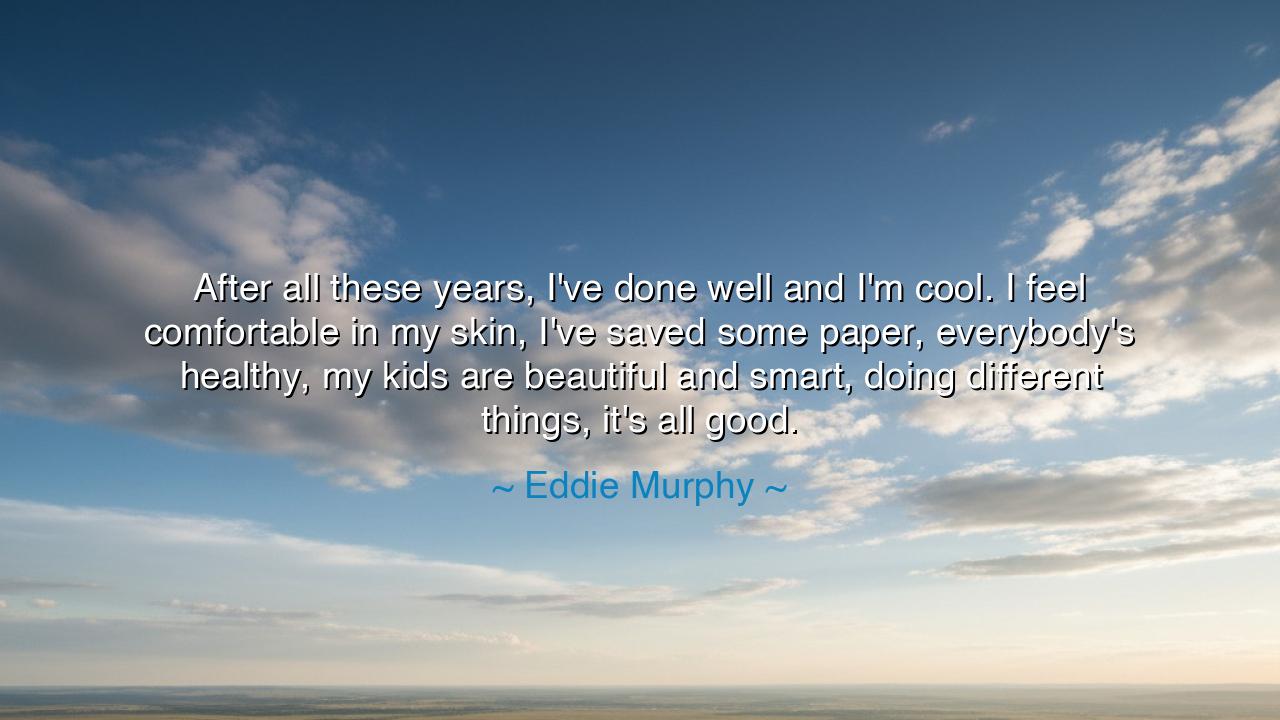
After all these years, I've done well and I'm cool. I feel
After all these years, I've done well and I'm cool. I feel comfortable in my skin, I've saved some paper, everybody's healthy, my kids are beautiful and smart, doing different things, it's all good.






“After all these years, I've done well and I'm cool. I feel comfortable in my skin, I've saved some paper, everybody's healthy, my kids are beautiful and smart, doing different things, it's all good.” These words spoken by Eddie Murphy resonate with the wisdom of a man who has traversed the turbulent waters of life and arrived at a place of peace, contentment, and fulfillment. He speaks not from a place of arrogance or self-congratulation, but from the perspective of someone who has come to appreciate the true treasures of life: health, family, self-acceptance, and financial security. These are the markers of a life well-lived, and Murphy’s words remind us of the enduring value of contentment.
In the ancient world, there was a concept that transcended all the wealth and grandeur one could accumulate—eudaimonia, or the good life. The great philosopher Aristotle taught that a life of fulfillment is not found in the accumulation of riches alone, but in the balance of virtue, wisdom, and happiness. To be comfortable in one's skin, as Murphy puts it, is to live in harmony with oneself, to have come to terms with one's imperfections and strengths. It is the ultimate realization that true wealth is not measured by external markers, but by the inner peace one cultivates over time.
Murphy’s words echo this ancient wisdom. In a world that often values material success above all else, he highlights the deeper, more profound accomplishments of his life. He speaks of his family’s well-being, of his children’s intelligence and beauty, of the health that anchors his success. This is a reflection of the Roman concept of "familia," where the well-being of the family unit—of the mind, body, and spirit—is central to a person’s happiness and legacy. For the Romans, it was not enough to merely achieve; one had to achieve in a way that benefited both oneself and one’s descendants.
Consider the life of Marcus Aurelius, the Stoic emperor, who, despite his immense power and wealth, found peace not in conquering the world but in conquering his own mind. He believed that true contentment comes from inner peace, from accepting the world as it is and our role within it. His Meditations speak of the importance of focusing on what is within our control—our actions, our health, our thoughts—and letting go of the rest. Like Eddie Murphy, Marcus Aurelius found that happiness and fulfillment are not dependent on external accomplishments, but on internal harmony.
Murphy also speaks of financial success, of having “saved some paper.” In the ancient world, wealth was often seen as a means to an end, rather than an end in itself. The Greeks and Romans recognized that prosperity should be used to ensure the welfare of one’s family and to contribute to the community, not hoarded for vanity or personal gain. Wealth, in this context, was a tool for creating a better life for those you love, and Murphy’s acknowledgment of this in his own life is a reminder that prosperity should be tempered with responsibility.
In his statement, Murphy reflects on the importance of family—of raising children who are “beautiful and smart” and are doing different things. This speaks to the legacy we leave behind, not in terms of riches, but in the way we nurture and guide the next generation. A legacy is not simply the wealth we accumulate, but the values, wisdom, and love we impart to those who come after us. Parents like Eddie Murphy understand that their true success is not measured by their own achievements, but by the lives they help shape, the lessons they pass on, and the love they cultivate.
The lesson of Murphy's words is one of balance. To live a fulfilling life is not to chase after fame or fortune for their own sake, but to focus on what truly matters: health, family, self-acceptance, and a sense of purpose. The practical steps to follow in this pursuit are clear: nurture your relationships, care for your body and mind, manage your wealth responsibly, and, most importantly, find peace within yourself. For in the end, it is not the accolades or the material possessions that matter most, but the quiet satisfaction of knowing that you have lived a life that reflects your values and has made the world a better place for those who come after you.






AAdministratorAdministrator
Welcome, honored guests. Please leave a comment, we will respond soon